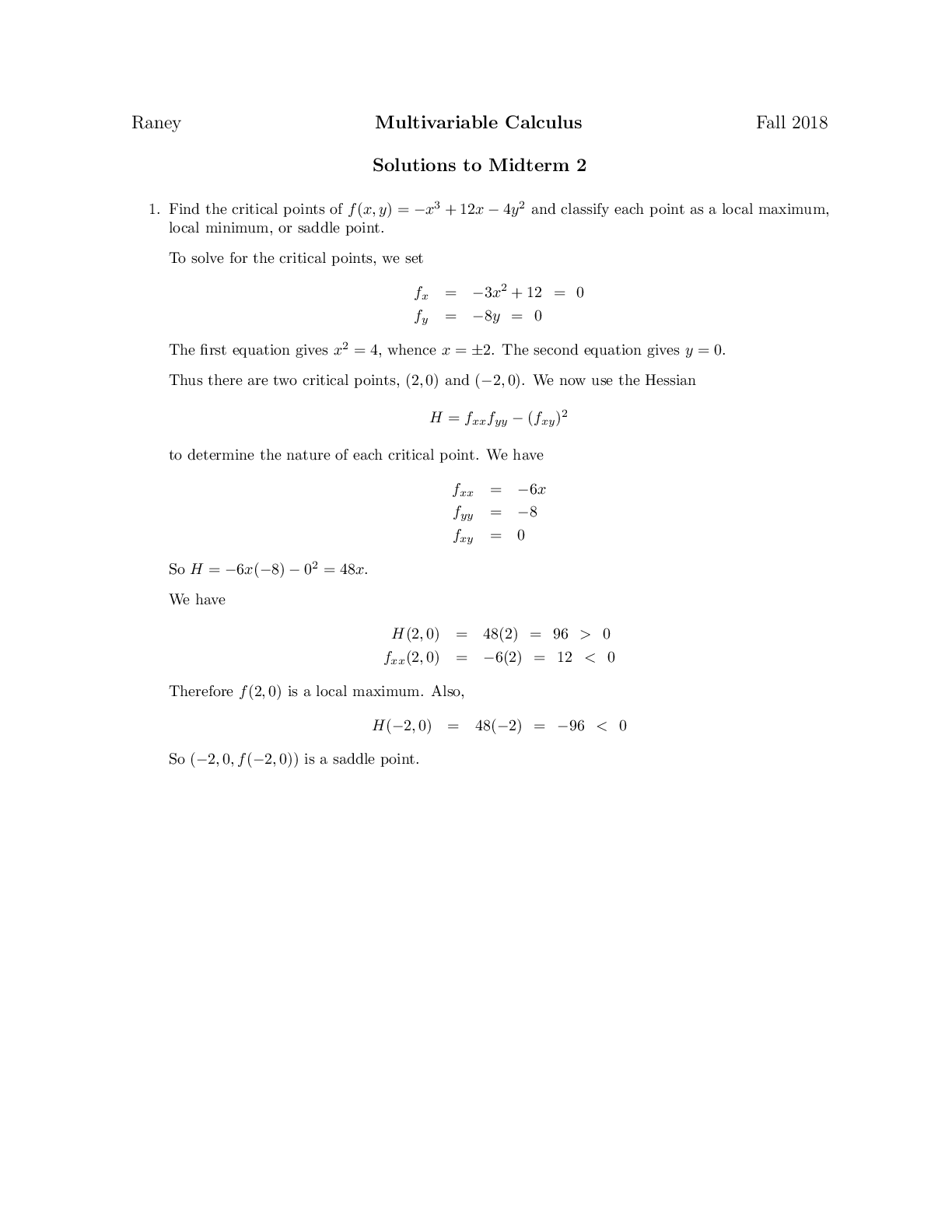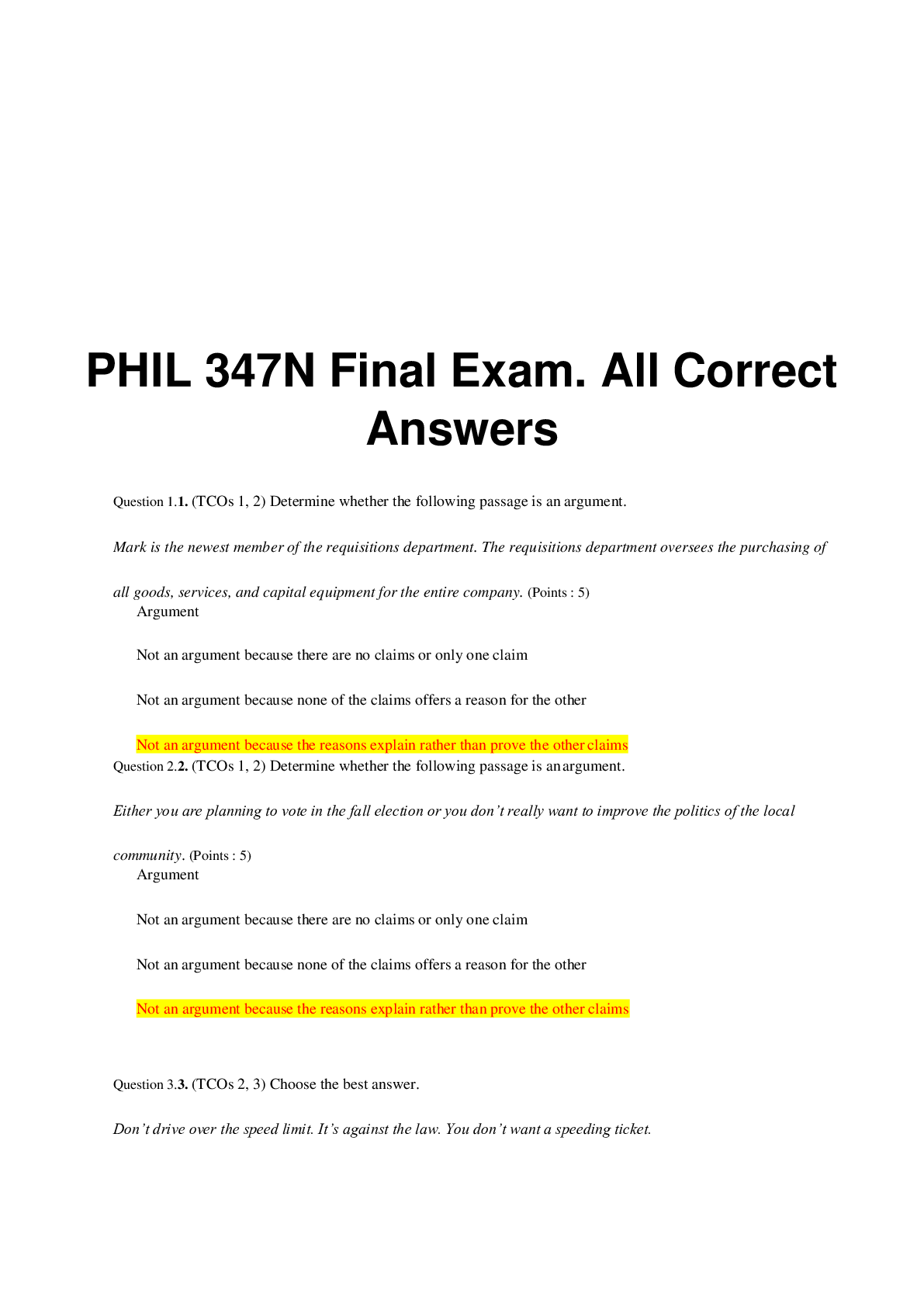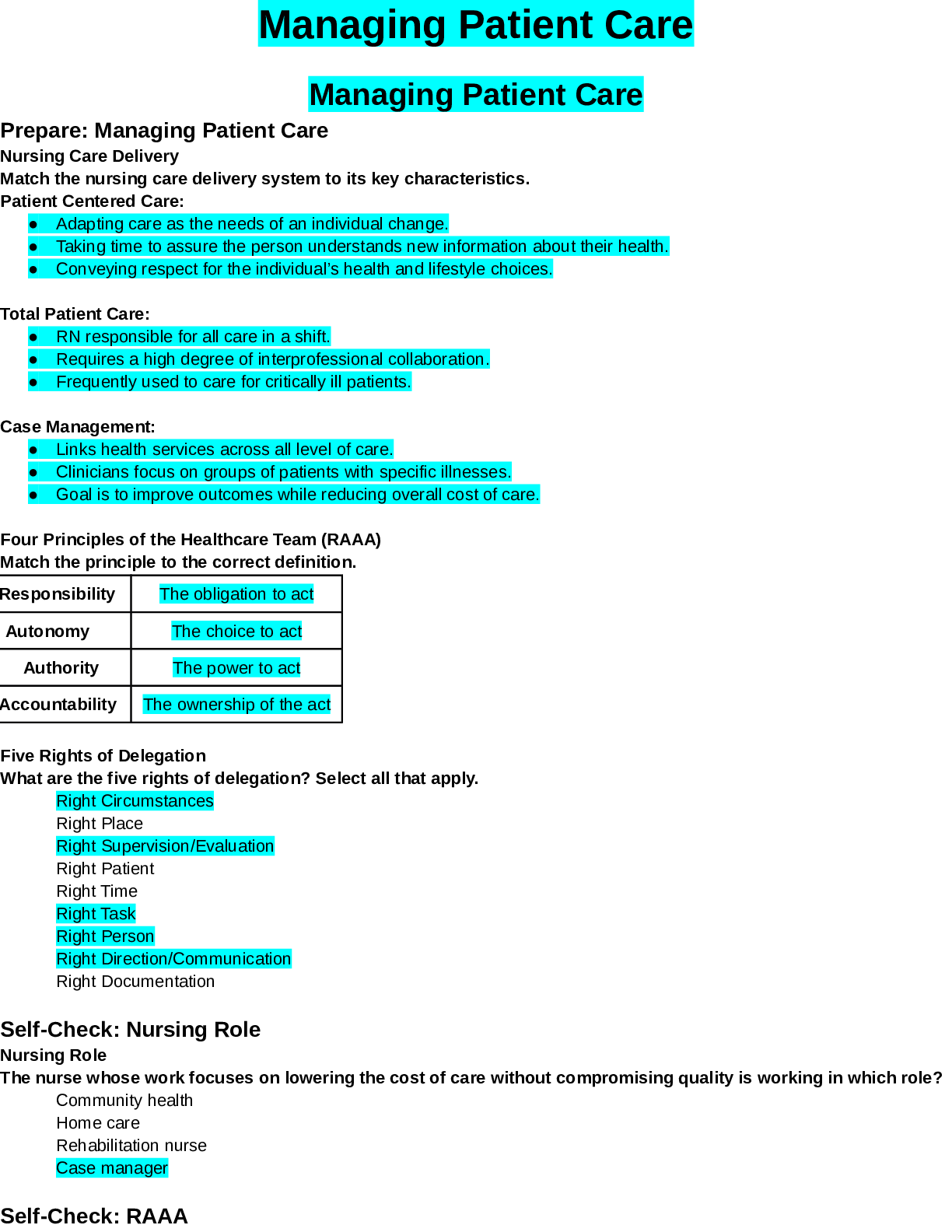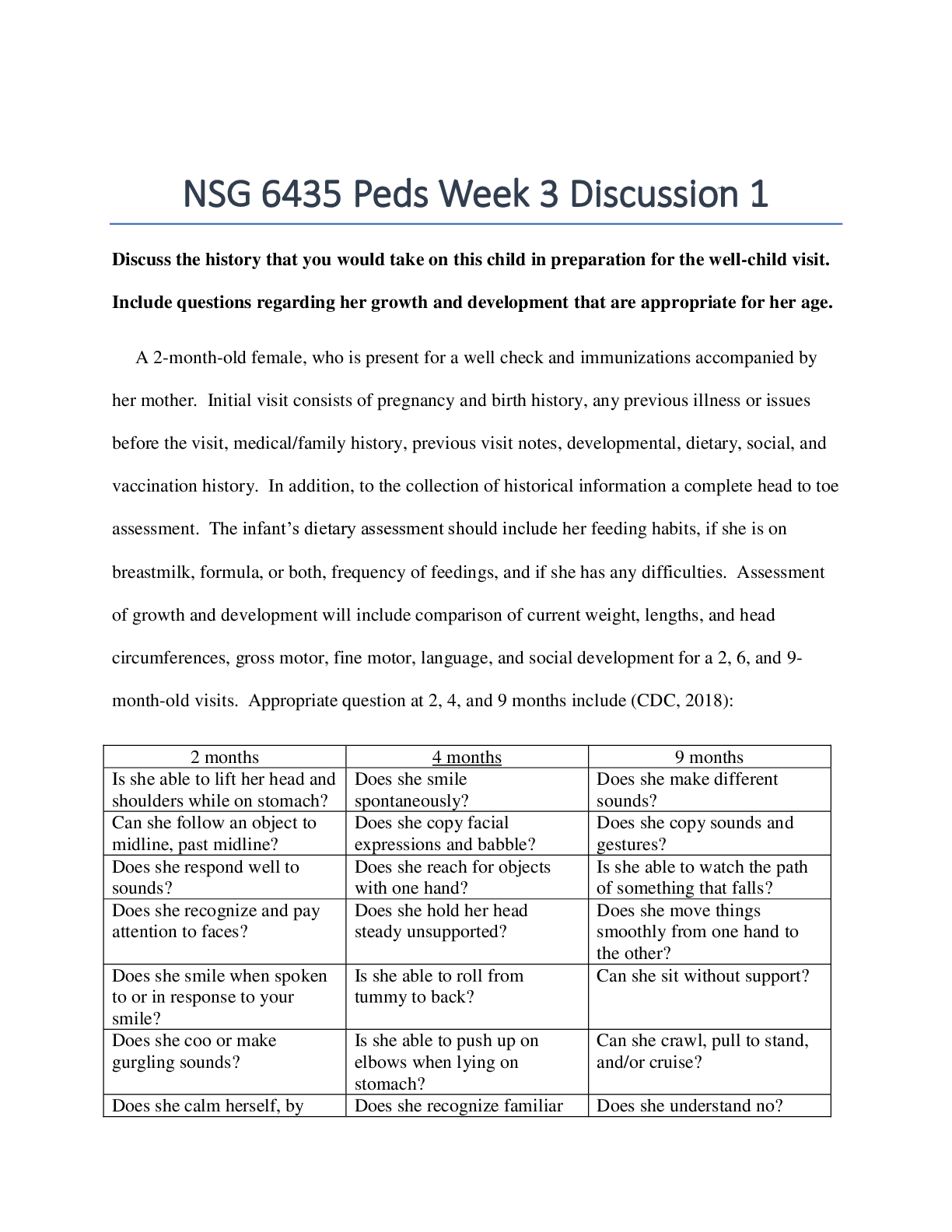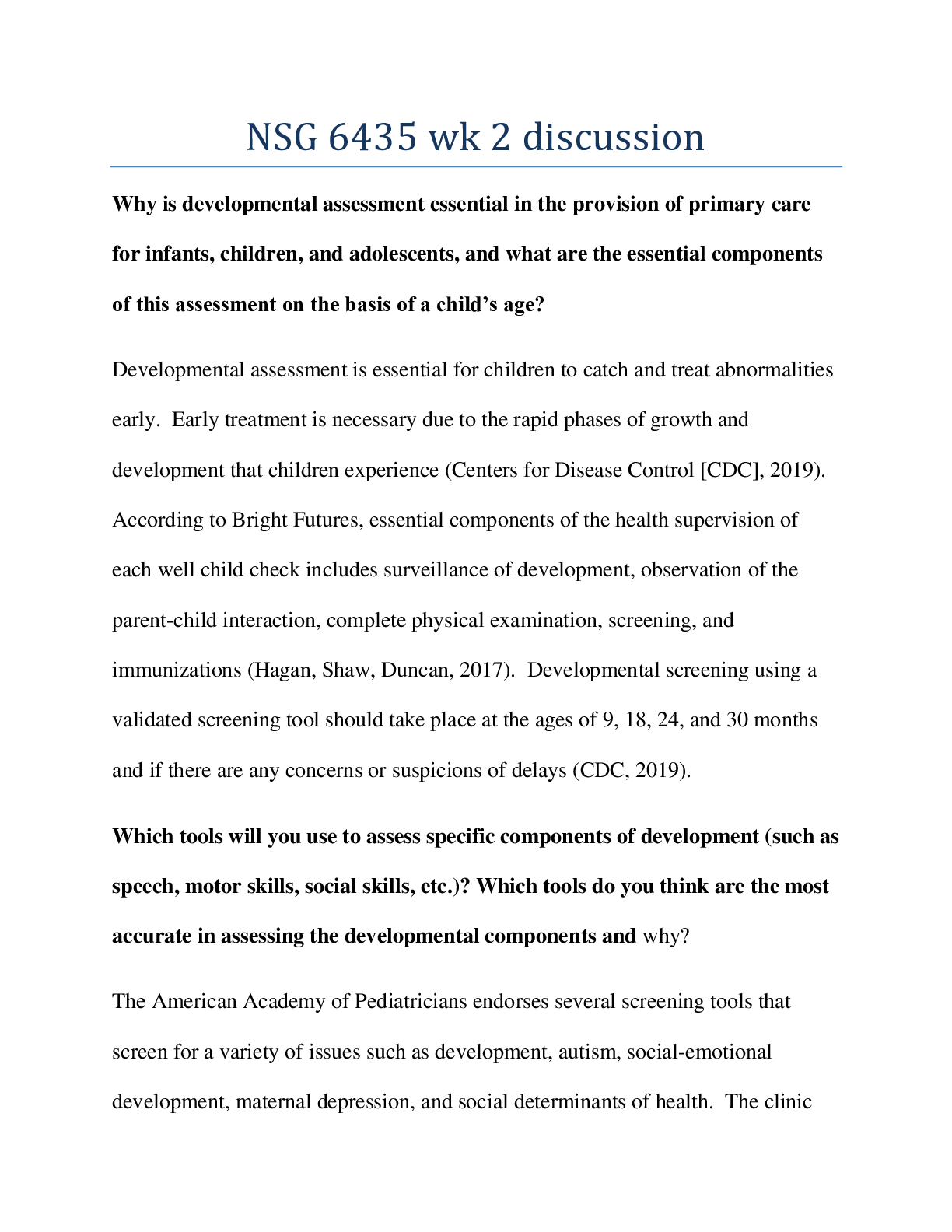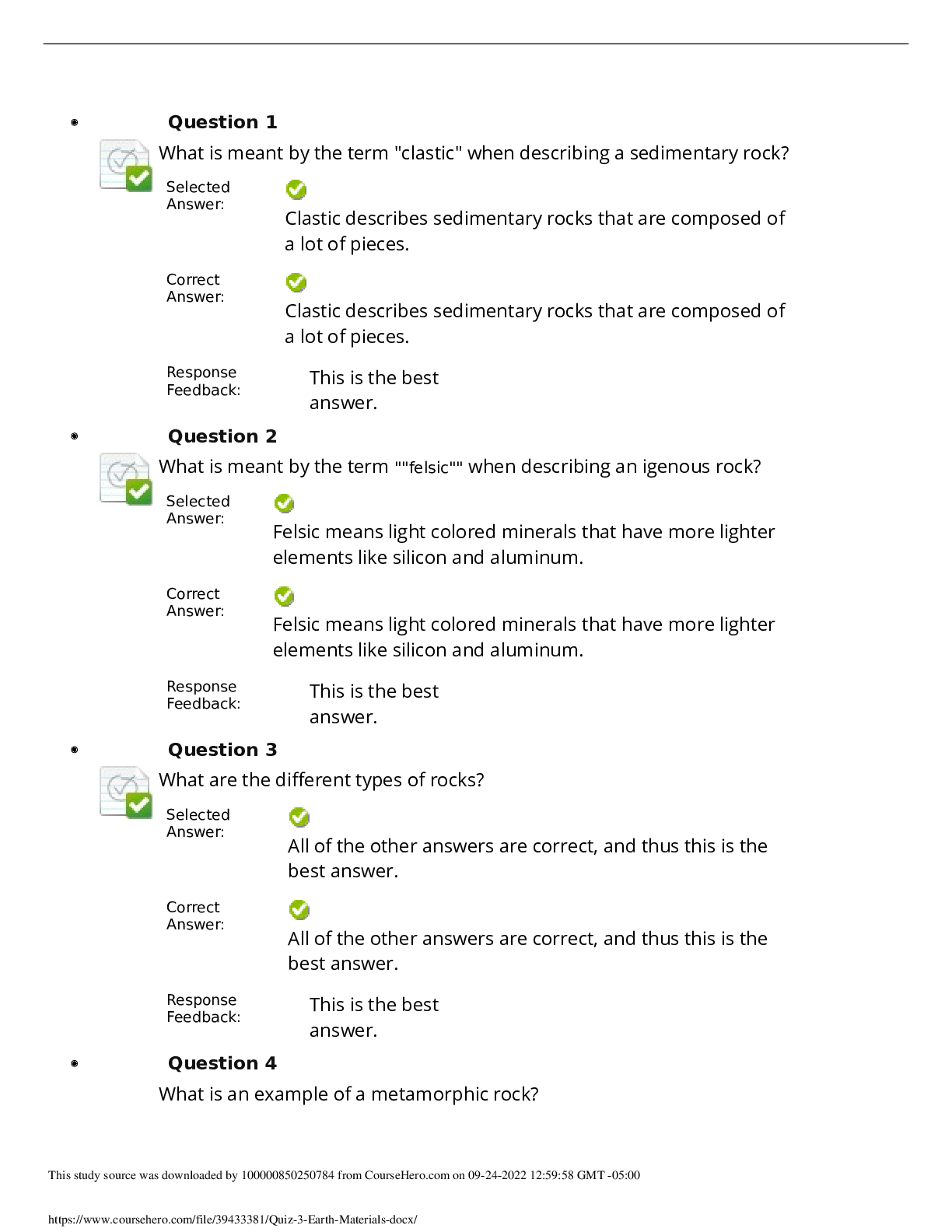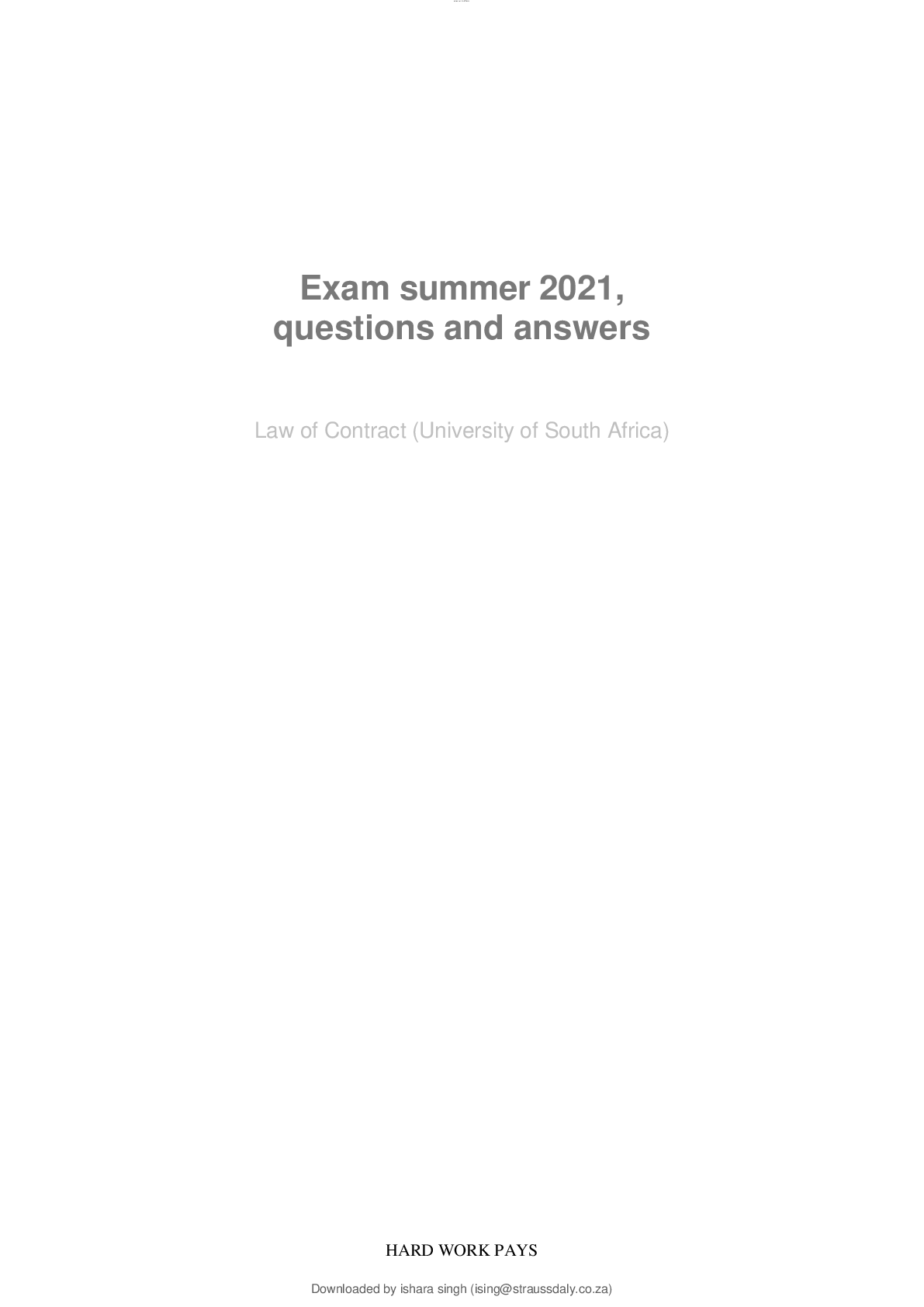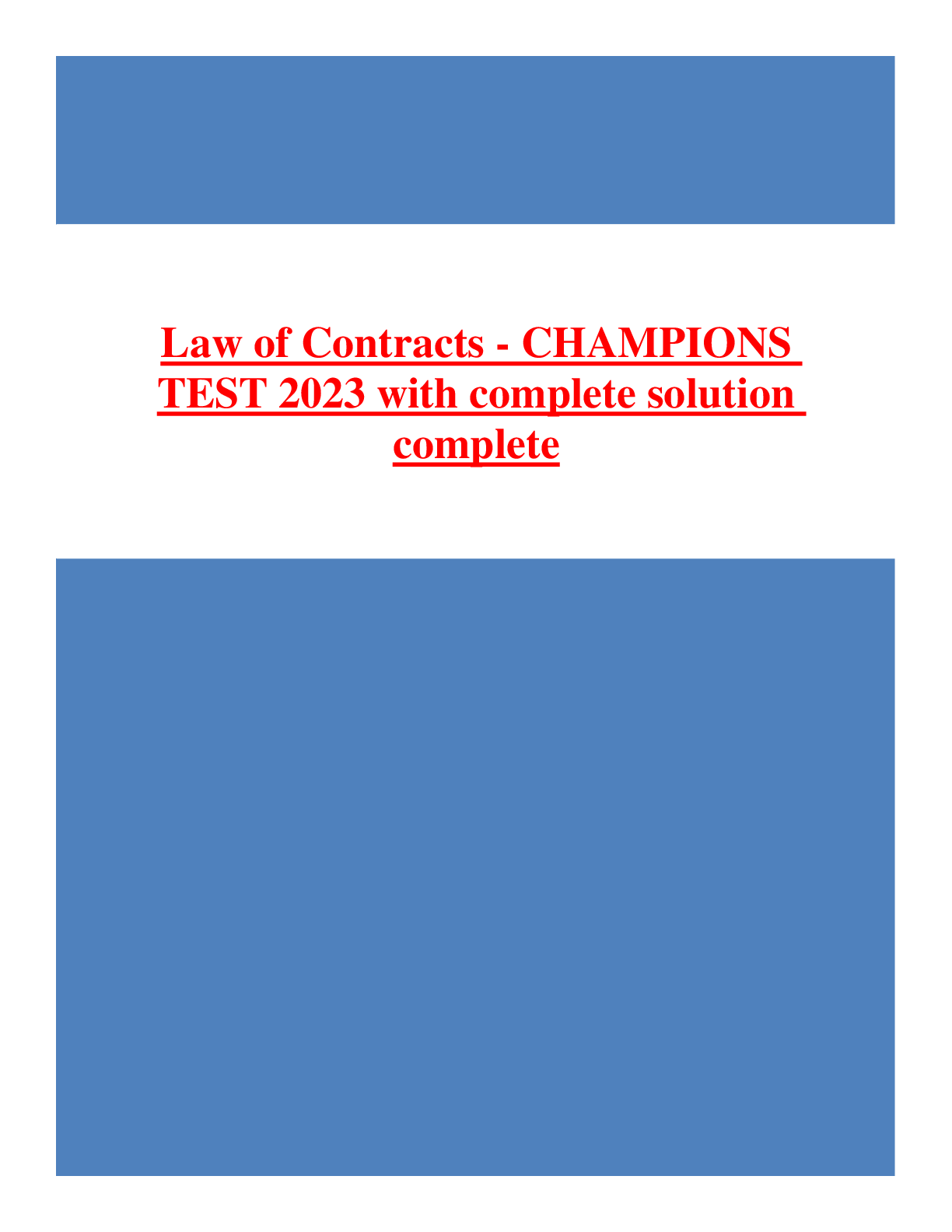Law > QUESTIONS & ANSWERS > Law of Contract (PVL3702): Sample Exam 2020: Questions With extended Answers Law of Contract (Univer (All)
Law of Contract (PVL3702): Sample Exam 2020: Questions With extended Answers Law of Contract (University of South Africa)
Document Content and Description Below
Law of Contract (PVL3702): Sample Exam 2020: Questions With extended Answers Law of Contract (University of South Africa) CONTRACT QUESTIONS AND ANSWERS: 1. Distinguish an option from a right of ... pre-emption. 2. Simon lives in Johannesburg, he sends a letter to Peter, who lives in Bloemfontein, by private courier. In the letter, Simon offers to sell Peter his car, a red Honda, for R200 000. In the letter, Simon states that his offer will fall away on 1 April. Peter accepts Simon’s offer by letter, which he posts on 30 March. Simon receives the letter on 5 April and only reads it the next day. Peter pays the R200 000 but Simon refuses to accept payment. Did a valid contract arise between Simon and Peter? Advise Peter and substantiate your answer. 3. Name and briefly discuss the requirements for a valid offer & a valid acceptance. Discuss with reference to case law. (15) 4. Briefly distinguish simple auction from auction subject to conditions. (5) 5. Discuss whether an advertisement & a promise of reward constitutes an offer. (10) 6. Discuss ‘Cape Explosive Case’ and ‘Smeiman v Volkerz Case’ with regards to the moment of formation of a contract (6) 7. State the possible remedies for breach of a pre-emption (4 of them) (3) 8. Briefly explain the legal nature and consequences of a right to pre-emption (5) 9. Martin wants to sell his art collection, since he is offering the collection at a bargain price he only wants to extend his offer to colleagues at work. Martin advertises by way of sending electronic mail messages to his colleagues. Monty obtains access to the computer network system at Martin’s work place and accepts Martin’s offer by sending Martin an electronic message. Once Martin discovers that Monty isn’t a colleague he alleges that no contract arose because the offer wasn’t made to Monty. Monty alleges that a valid contract did arise because the electronic mail message sent by Martin doesn’t specifically state that the offer was only open to Martin’s work colleagues. Discuss with reference to ‘Steyn v LSA Motors’ and other relevant case law whether a valid contract arose between Martin and Monty. (15) OR: S wants to sell his collection of Beatles compact discs. Since he is offering the collection at a bargain price he only wants to extend his offer to colleagues at his work. S advertises by way of sending electronic mail messages to his colleagues. P, a computer genius who has broken into the computer system at S's place of employment, accepts S's offer by sending an electronic mail message to S. Once S discovers that P is not a colleague he alleges that no contract arose because the offer was not made to P. P alleges that a valid contract did arise because the electronic mail message sent by S did not specify that the offer was only open to S's work colleagues. Discuss whether a valid contract arose between S and P with reference to Steyn v LSA Motors Ltd 1994 (1) SA 49 (A).(15) 10. X and Y did business with each other for 3 years. Thereafter X inserted a new clause in the contract that they used without Y’s knowledge. This clause reserved ownership in X’s favour of goods that Y ordered from X. Although reference was made to the clause in the invoice, X didn’t draw Y’s attention to the clause. Y alleged that he was not bound by the contract in which the new clause appeared as he wasn’t aware of it. Discuss with reference to case law. (15) 11. Discuss the indirect approach to the reliance theory. Refer to case law. (10) 12. Perren takes his bike vehicle to Dick’s Bikes for a service. On his arrival, he is asked to sign a check card by the owner. Perren enquires why he is required to sign the check card and the owner explains to him that by signing he is authorising them to conduct the service on his bike which will cost R800. He signs the check card without reading it. While servicing the bike, the service manager finds faults on the bike (unrelated to the service) and he proceeds to do these additional repairs for a further R1 000. Perren refuses to pay for the additional repairs and argues that he did not authorise such repairs. The owner of Dick’s Bikes argues that Perren is obliged to pay for the work done as the check card contains a contractual clause authorising Dick’s Bikes to do any repairs on the bike which they deem necessary without asking the client’s authorisation and requiring the client to pay for such repairs. Advise Perren on whether he is liable on the contract to pay Dick’s Bikes R1 000 for the additional repairs. Substantiate your answer and refer to relevant case law. Apply the direct approach of the courts in answering this question. (10) 13. The following advertisement appears in the newspaper, the Sunday Reporter: “AUCTION TOMORROW MORNING” A smallholding (portion 1 of the Farm 876, West Road, George) will be sold on Monday, June 21 at 10 am by auction at the property, next to No 11 on the Varkensvlei Road. 9 950 square meters of vacant land in this sought after area must be sold! Quick sale Auctioneers” X reads the advertisement and decides to attend the auction. The next day the auction is held. Before the auction begins, the auctioneer announces to those present that the smallholding being sold is 300 meters further down the road and not at the advertised place, where they are standing. Unfortunately, the auction is already in progress when X arrives and he misses the announcement. The smallholding is not sold during the auction. X visits the auctioneer the following day. The auctioneer gives X a street map of the area and tells X that the smallholding is next to the Highlands Estate. X does not know where the boundary of the Highlands Estate is with the result that X never realizes that the smallholding is actually 300 meters down the road. X concludes a contract of sale with the auctioneer acting on behalf of the owner of the smallholding, Y. After conclusion of the contract of sale X discovers that the size of the smallholding is only 9000 square meters and that the smallholding is actually situated 300 meters down the road. You may accept that the contract of sale complies with the required formalities and that the auctioneer acted as Y’s representative at all times. Discuss whether X is bound by the contract with reference to relevant case law. Similar mistake question: John, a racehorse owner, advertises for sale the horse Fire for R1.5 million. In the advertisement it is stated that Fire is an offspring of the legendary July winner, Lightning. Peter is a horse breeder who specifically wishes to introduce the bloodline of Lightning into his stud. He agrees orally with John to buy Fire for R1.5 million. Later, in order to meet the requirements of the horse breeders’ association, John has a written contract drawn up which Peter signs without reading. The contract makes no mention of Fire's ancestry, but does contain a clause exempting John from liability for any representations made during negotiations or in the contract. Peter's attention is not drawn to these facts. A month later Peter finds out that Fire is in fact not an offspring of Lightning, although at the time of the conclusion of the contract John genuinely and without any fault on his part believed that to be the case. Advise Peter on whether the contract of sale is valid. Substantiate your advice and refer to relevant case law. Apply the subjective approach of the courts in answering this question. Do not apply the Consumer Protection Act to this question. (10) 14. Chantel is on her way from work and sees a white cat hiding in a doorway. Being an animal lover, she takes the cat home with her. The next day, she sees the following advertisement in the newspaper: “Lost in Johannesburg City Centre on 10 May. Pedigree white cat, female, black tip on her tail. Answers to the name of Peetree. Reward of R6 000 for information leading to safe return. Tel 083 333 3333.” She realises that the cat she found matches the description given. She calls the advertiser who rushes over to be joyfully united with Peetree. In her joy, Peetree’s owner, Helen, seems to forget about the reward and Chantel wishes to claim it from her. Will she be successful? Substantiate your answer. (10) 15. P wants to buy an agricultural smallholding from S, who owns several such holdings situated on land a short distance from Johannesburg. During negotiations S points out one of the holdings to P, who decides to buy that particular holding. Unbeknown to P, the written contract of sale subsequently entered into between him and S refers to another of S’s holding adjacent to the one he has seen. Is S bound by the contract sale? Discuss with reference to Allen v Sixteen Stirling and other relevant case law. 16. S sold his house to P for R900 000. During the negotiations P asked if the swimming pool was sound and S replied “of course”. S did not know that the pool was leaking at the time of the contract but should have realized that it was leaking because big quantities of water had to be added regularly to the pool. After P took occupation of the house he finds that the pool is leaking and that it will cost R30 000 to repair. P does not wish to cancel the contract because she loves the house. She, however, wishes to claim damages from S. Discuss the manner in which damages will be calculated by the court. Refer to Ranger v Wykerd and De Jager v Grunder. 17. Mkhabela, a government institution, which was the owner of certain immovable property in a township, mistakenly accepted the tender submitted by Yello to purchase a certain erf in the township. The board of Mkhabela actually decided to accept the tender submitted by Zorro, but the manager of Mkhablea, who is responsible for the conclusion of contracts on behalf of Mkhabela, by mistake sent the letter of acceptance to Yello. Yello incurred expenses to perform in terms of the contract. However, Mkhabela later realized its error and averred that it was not bound to perform in terms of the contract because the manager had not been authorized to accept Yello’s tender. Discuss Yello’s position with reference to National and Overseas v Potato Board and other relevant case law. (10) 18. X and Y concluded a written contract of sale of immovable property in which the description of the property was so deficient that it didn’t comply with statutory requirements regarding the description of the property in such deed of sale. Y Alleges that the sale is void for lack of compliance with the statutory formalities. While X wants to uphold the contract. Discuss with reference to ‘Magmwza v Heenan’. (10) 19. S sells his farm to P for R100000. There is a pine plantation on the farm and P purchases the farm for the purpose of growing and selling pine wood. During negotiations S points out the boundaries of the farm to P and includes a piece of land 300 square meters. Which in actual fact is part of an adjoining farm, with the purpose of persuading P to conclude the contract. S knows that the piece of land isn’t part of his farm. The market value of the farm is R900000. P would only have been prepared to pay R800000 if she had known the true state of affairs. Discuss all the remedies which P possibly may have. Refer to ‘Trotman v Edwick’ and ‘Phame v Paizes’. (10) 20. Samuel, a jeweller displays 2 seemingly identical rings in his shop window. The 1 contains diamonds and the other only crystals. Pat walks into the shop, points out the crystal ring to Samuel and offers to buy it for R10000. Nothing is said about the material from which the ring is made. Pat thinks she is buying a diamond ring, while Samuel believes that Pat wants to buy the crystal ring. Samuel accepts Pat’s offer. (a) Does a valid contract arise? Discuss (5) (b) Does Pat have any other remedy available against Samuel besides possibly having the contract declared void? Discuss. (7) (c) Would a valid contract arise if both Samuel and Pat believe that they are contracting for the diamond ring? Discuss with reference to ‘Dickinson Motors v Oberholze’. (8) OCTOBER 2015 EXAM Q!!!!! 21. Discuss undue influence with reference to “Preller v Jordaan” (10) 22. X wants a car just like the one his neighbor Y has. X knows that Y cheats on his income tax since Y often boasts of this. Consequently, X tells Y that if Y does not sell his car to him for R20 000, he will report Y to the receiver of revenue. Y sells his car to X for the amount mentioned although it is worth R100 000. Will Y be able to have the contract set aside? Discuss with reference to relevant case law. 23. X wants to conclude a lucrative contract with company Y. To ensure that he is successful, X agrees with the agent of Y, who is responsible for concluding contracts on behalf of Y that for a fee the agent will ensure that the contract will be awarded to X. After the contract has been concluded between X and Y, and both parties have performed, the financial director of Y discovers how X secured the contract. Discuss the implication of both the agreement between X and the agent of Y and the agreement between X and Y. You must also discuss whether Y has a remedy in the circumstances and how it is to be exercised. (15) 24. State the questions which the court formulated in “Basson Case” to determine the reasonableness of an agreement in restraint of trade. (4) 25. X concludes an apprenticeship contract with Y for a training period of 2 years. In terms of the contract X isn’t allowed to work in the village for a period of 12 months after the termination of the contract. X wishes to start a hairdressing business of her own at the end of her training period. She decides to contest the restraint of trade clause. Advise X fully. Refer to “Magna Alloys Case” and other relevant case law. (15) 26. Discuss the rule in pari delicto potior est condition possidentis with reference to Jajbhay v Cassim 1939 AD 537. 27. State the test to decide if a restraint of trade clause is enforceable. (5) 28. X, Y & Z buy S’s car for R300000. The parties agree that the car must be delivered immediately and that the price only be paid in a week’s time. S delivers the car immediately, but the price isn’t paid after a week’s time. S 33 CLS cc Contract Questions Semester 1 – 2019 claims R300000 from X. X’s defence is that S must claim R300000 from X, Y and Z. Discuss X'’ defence. (5) 29. Explain briefly what you understand by the Parol Evidence Rule. (6) 30. Discuss “Goldblatt v Fremantle”. (5) 31. X claims R1000 from Y. Y denies that he owes X any thing but nevertheless sends him a cheque for R250 saying that the cheque offered is “in full settlement and to avoid litigation”. X deposits the cheque and then institutes action for the R750. Can X successfully institute action against Y? Would the position have been any different if Y had said in his letter: “I owe you R250 only? My cheque for this amount is enclosed”? Discuss. 32. Sam has been leasing commercial property from Zeek for the past 4 years. The lease will come to an end on 31 January 2011. On 5 November 2010 Sam phones Zeek and offers to renew the lease for a further 4 years and then Zeek accepts. During the call, the material terms of the renewal agreement are agreed upon and Sam and Zeek agree also that the material terms must be reduced to writing and signed by both parties. Then on the 5th of December, Sam is shocked to receive a letter from Zeek, advising Sam that there will be no renewal of the lease and that Sam should vacate the leased property on 31 January 2011. Sam and Zeek never reduced their oral agreement to writing. Advise Sam if a binding agreement with Zeek exists, for the renewal of the lease for a further 4 years. Refer to Goldblatt v Freemantle 1920 AD 123 in your answer. 33. Y sold a plot to X that bordered on a stream. The parties understood that X specifically wanted the plot because there were pumping rights in respect of the stream but a clause to that effect was not inserted into the contract. The parties merely assumed that pumping rights did exist. Later X discovered that there were, in fact, no pumping rights. Discuss whether X is bound by the contract with reference to Fourie v CDMO Homes (Pty) Ltd 1982 (1) SA 21 (A) (10) (a) Y let premises to X. the lease contained a clause prohibiting X from subletting the premises without the written consent of Y. A further clause of the lease required that any variation of the terms of the lease had to be in writing and signed by both parties. Later Y told X that he could sublet a portion of the premises. After X had sublet a portion of the premises to a third party, Y changed his mind and informed X that both X and the third party must vacate the premises because X had breached the contract. Discuss X’s position with reference to SA Sentrale Ko-operatiewe Graanmaatskappy Bpk v Shifren 1964 (4) SA760 (A). (b) Assume that X and Y did sign a variation of the lease allowing X to sublet a portion of the premises and thereafter Y changed his mind anyway and prohibited X from subletting. Discuss X’s position with reference to Tuckers Land and Development corporation (Pty) Ltd v Hovis 1980 (1) SA 645 (A). c) Discuss tacit terms, tacit implied terms from the facts, with reference to the description of tacit terms, the hypothetical bystander test and its application, trade usage and the distinction between tacit terms, express terms and terms implied by law. Refer to case law in your answer. 34. Write notes on: A supposition in a contract. (5) 35. Discuss “unfair contracts” with reference to case law. (10) 36. Name 5 forms of breach of contract. (5) 37. S sells his house to P and the parties conclude a contract of sale that complies with formal requirements. Thereafter, S receives a higher offer for the house from Z, which he also accepts and the parties concludes a contract of sale that also complies with the formal requirements. Z is unaware of the contract between S and P and sells his own house and proceeds to contract a removal company to assist him with the move at a price of R20000. Z doesn’t work for 3 days during the move. He earns a R1000 on average per day as an insurance broker. When Z arrives at the house of S to take occupation, he finds that it is already occupied by P, advise Z fully. (10) 38. Write notes on: The exceptio non adempleti contractus. (10) 39. Discuss the principle of reciprocity. (5) 40. Write notes on: The court’s discretion to refuse an application for specific performance. (10) 41. X and Y are involved in a protracted negotiation to conclude an intricate software contract; X spends R8000 to do the required calculations. The parties are very close to agreement when Y suddenly breaks off negotiations. Can X institute action against Y? Discuss. (4) 42. Discuss the concept of “Reasonable Time” with regards to mora debitoris. (10) 43. Write notes on the 2 principles, which can be applied to determine whether a party who commits breach of contract will be liable to pay damages for special damages. (10) 44. Write notes on: The difference between mora creditoris and prevention of performance. (5) 45. John is the owner of a vacant stand and he concludes a contract with a builder, Peter. In terms of which Peter must build him a house on the stand according to a plan supplied by John. In terms of the contract, Peter must complete the house by the 1st of July. Peter will be paid in full on the completion of the building. Peter completes the building on the 1st of July but it transpires that the house is 15 square meters smaller than the specifications required by the plan. Peter claims the full contract price from John. Advise fully. (15) What would the position be if John only discovered the defect in the house after he had paid Peter in full. Advise Peter. (5) 46. P buys a fridge from S for R500 on 18 October. P pays the purchase price immediately. They agree furthermore that P will fetch the fridge on 20 October at S’s house. P fails to turn up at S’s house on 20 October. S is very glad because he has found another buyer who is prepared to pay R1000 and he cancels the contract immediately. Was S entitled to cancel the contract and did S breach the contract by doing so? Discuss. (10) 47. Write notes on: a) The difference between general damages and special damages. (5) b) Restitution by the party claiming rescission of a contract due to the other party’s breach of contract. (5) c) Special damages for breach of contract. (5) 48. B builds a swimming pool for O. Parties agree that the pool must be completed on 27 July 2006. Contract price is R20000 and O pays R5000 upon signing the agreement. On 27 July B and O inspected the pool, but O isn’t satisfied. Paving around the pool is covered in cement splotches and pool requires another layer of paint. O is of the opinion that B has committed breach of contract. He refuses to pay B a cent further and forbids B to set foot on the premises again. (a) Did B commit breach of contract? Substantiate answer. (4) (b) Can O cancel the agreement? Substantiate answer. (2) (c) Did O commit breach of contract if you assume that O may not validly cancel the agreement? Substantiate your answer. (2) What remedy/s does O have at his disposal Where B institutes action for the balance of the purchase price and the agreement isn’t cancelled? Substantiate answer. (6) 49. Discuss the concepts mora ex re and mora ex persona. 50. Write notes on: The reduction of a penalty amount in a contract (5) Application of the exceptio doli (5) Security cession (4) Novation (Novatio): Write notes on: Set-off (5) 51. Discuss “Peters, Flamman & Co v Kokstad Municipality” with regards to supervening impossibility of performance (5) 52. Distinguish between delegation & cession (4) 53. E & O agree that E will work at 1 of O’s hotdog stalls at the FNB stadium during the variation games of the soccer world cup at remuneration of R2000 per day. Since E who has been unemployed for 6 months is desperate for money, O guarantees that E will be given this job. But structural defects are discovered in the stands at the FNB stadium & as a result all the games scheduled to be played there are cancelled. Advise E. (6) 54. James sells a new navigation system to Patrick for R300000 and undertakes to install it on Patrick’s trawler. James warrants that the system complies with a number of specifications. Month after James has installed system and Patrick has paid James the R300000 the trawler is lost at sea during a storm. 3 years later, Patrick finds out that the system didn’t comply with most of the specifications. Patrick cancels the contract in writing. Letter of rescission is delivered to James who never reads the letter because the letter is lost amongst the correspondence on his untidy desk. James refuses to pay Patrick back the R300000. 55. Discuss the current role of the underlying principles in the South African law of contract 56. X hands in her shocking pink sued jacket at the dry cleaner. Y hands her a receipt. On the back of the receipt is a clause excluding Y’s liability in the event of negligent damage to or theft of any goods handed in for dry cleaning. The same words appear on a big notice board in the shop which is clearly visible. When X fetches her jacket, she is dismayed to discover that the jacket’s colour has been changed by the dry cleaning process. Is she bound by the exemption clause? Discuss briefly. (5) 57. “Illegal contracts in terms of Statute” - does the statute intend to nullify the contract OR merely fine the wrongdoer? 58. On 1 April, X buys a house from Y for R500 000. It is a term of the contract that transfer will be given within a reasonable time after the buyer has lodged bank guarantees to secure payment of the purchase price. X lodges the required guarantees on 1 May, but on 1 August transfer has not yet been given. On this date X advises Y that he is resiling form the contract with immediate effect, and is claiming R25 000 damages. Discuss with reference to case law. You may assume that the contract of sale complies with all the formal requirements 59. Critically discuss one of the following cases with regard to damages caused by a breach of contract: 1. Whitfield v. Phillips 1957 (3) SA 318 (A) 2. Shatz Investments Pty) Ltd v. Kalovyrnas 1976 (2) SA 545 (A) 3. Lavery & Co. v. Jungheinrich 1931 AD 156. (10) Lavery & Co Ltd v Jungheinrich 1931 AD 156 Whitfield v. Phillips 1957 (3) SA 318 (A) Shatz Investments (Pty) Ltd v. Kalovyrnas 1976 (2) 545 (A) [Show More]
Last updated: 2 years ago
Preview 1 out of 66 pages

Buy this document to get the full access instantly
Instant Download Access after purchase
Buy NowInstant download
We Accept:

Reviews( 0 )
$9.00
Can't find what you want? Try our AI powered Search
Document information
Connected school, study & course
About the document
Uploaded On
Aug 01, 2020
Number of pages
66
Written in
Additional information
This document has been written for:
Uploaded
Aug 01, 2020
Downloads
0
Views
593

